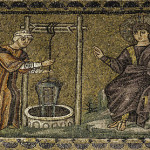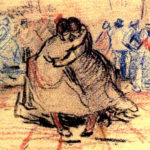We run our website the way we wished the whole internet worked: we provide high quality original content with no ads. We are funded solely by your direct support. Please consider supporting this project.
When God is Revealed
Whether we’re talking about our relationship with God or with other people, the quality of our relationships can never go beyond the level of trust the relating parties have in each other’s character. We cannot be rightly related to God, therefore, except insofar as we embrace a trustworthy picture of him. To the extent that our mental picture of God is untrustworthy, we will not rely on him as our sole source of life. This is why the first thing that Satan went after was Eve’s conception of God. The story reflects the truth that the root of our alienation from God and our bondage to fallen powers is our own untrustworthy and unloving mental pictures of him.
This is as true today as it was in the garden. Paul tells us that the gospel continues to be “veiled … to those who are perishing” because the “god of this age has blinded the minds of unbelievers, so that they cannot see the light of the gospel that displays the glory of Christ, who is the image of God.” And notice, the seeing Paul is talking about is a seeing in our mind (2 Cor. 3:14-15). Nor can those who are yet under Satan’s blinding oppression receive the “light” that God wants to “shine in [their] hearts to give [them] the light of the knowledge of God’s glory displayed in the face of Christ (2 Cor 4:3-4, 6).
Only when the Spirit lifts the veil from our minds and hearts can we form and embrace a truly accurate picture of God. Only when the Spirit frees us from the blinding oppression of the “god of this age” can our hearts and minds see the glorious beauty of the God revealed in Christ. And only as we “with unveiled faces contemplate the Lord’s glory” can we be “transformed into his image with ever-increasing glory” (2 Cor 3:17-18).
What this shows is that the revelation of God in Jesus, most clearly reflected on the cross, is the foundation of the new covenant because it is God’s definitive refutation of all false images of him. Jesus described himself as “the way and the truth and the life” (Jn 14:6). The Greek word for “truth” (aletheia) has the connotation of something “uncovered” or “not concealed.” While we’ve been, to one degree or another, blinded by our sin and the “god of this age” from seeing the true, glorious character of God, he is finally fully unveiled in Christ.
This is why Jesus is also the “way” to the Father as well as the “life” of the Father. We can only experience the life that God wants for us when we know and trust his true character as it’s unveiled in Christ.
And we are making the same point from the opposite direction when we point out that, when Jesus fully unveiled the true character of the one true God on the cross, he “disarmed the powers and the authorities,” vanquished Satan and his minions (Col 2:14-15), and thereby set free all who would accept this truth. On the cross, the light expelled the darkness, the truth vanquished all deception, and the beauty of the true image of God destroyed the ugliness of all false images. And so now, for all who will yield to the Spirit, as the veil over our minds is removed, we can see “God’s glory displayed in the face of Jesus” (2 Cor 4:6) and be set free to enter into the loving, trusting, and transforming relationship God has always wanted to have with his people.
Category: General
Tags: Cruciform Theology, God, God's Character, Jesus, Relationships, Trust
Topics: Christology
Related Reading

Why Bart Ehrman Doesn’t Have to Ruin Your Christmas (Or Your Faith) Part 2
This is the second of several videos Greg put together to refute Bart Ehrman’s claims published in the article What Do We Really Know About Jesus? If you missed it, you can catch the first installment here.

Forgiveness in the Christus Victor View of the Atonement
Did Jesus need to die on the cross to satisfy God’s wrath in order for us to be forgiven? Greg discusses the role of forgiveness in the Christus Victor view of the Atonement.

Responding to Driscoll’s “Is God a Pacifist?” Part I
I’m sure many of you have read Mark Driscoll’s recent blog titled “Is God a Pacifist?” in which he argues against Christian pacifism. I’ve decided to address this in a series of three posts, not because I think Driscoll’s arguments are particularly noteworthy, but because it provides me with an opportunity to make a case against what I’ve…

Podcast: Where is the Foundation of Our Trust in the Old Testament?
Greg looks at what he considers the foundation of trusting in the Bible. http://traffic.libsyn.com/askgregboyd/Episode_0310.mp3

God is Different Than You Think
The revelation of “[a] God humiliated even unto the cross,” as Pascal put it, flies in the face of what most Jews of Jesus’ time, and of what most people throughout history, have expected God to be. In this light, we can discern the thematic centrality of the cross in Jesus’ many teachings that reverse…

What Does It Mean to Be Married to Christ?
The New Testament calls Christ the “bridegroom” and the church his “bride.” To understand what this means can change your life. We need to read this through the lens of first century Jewish marriage. In what follows we’ll highlight six aspects of first century Jewish marriages to see how each sheds light on the New…

